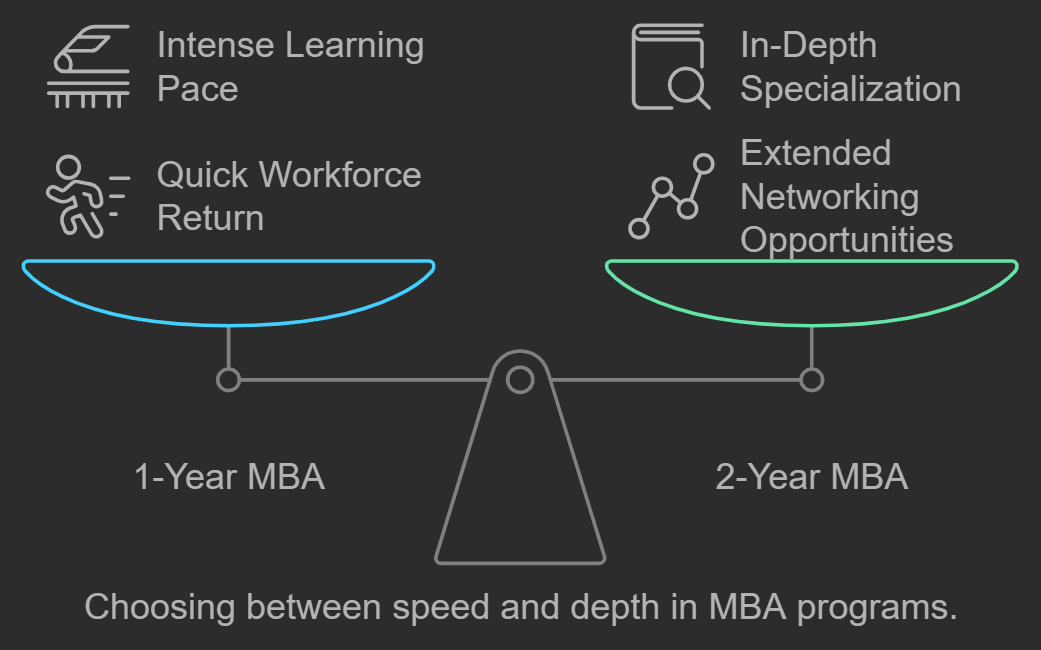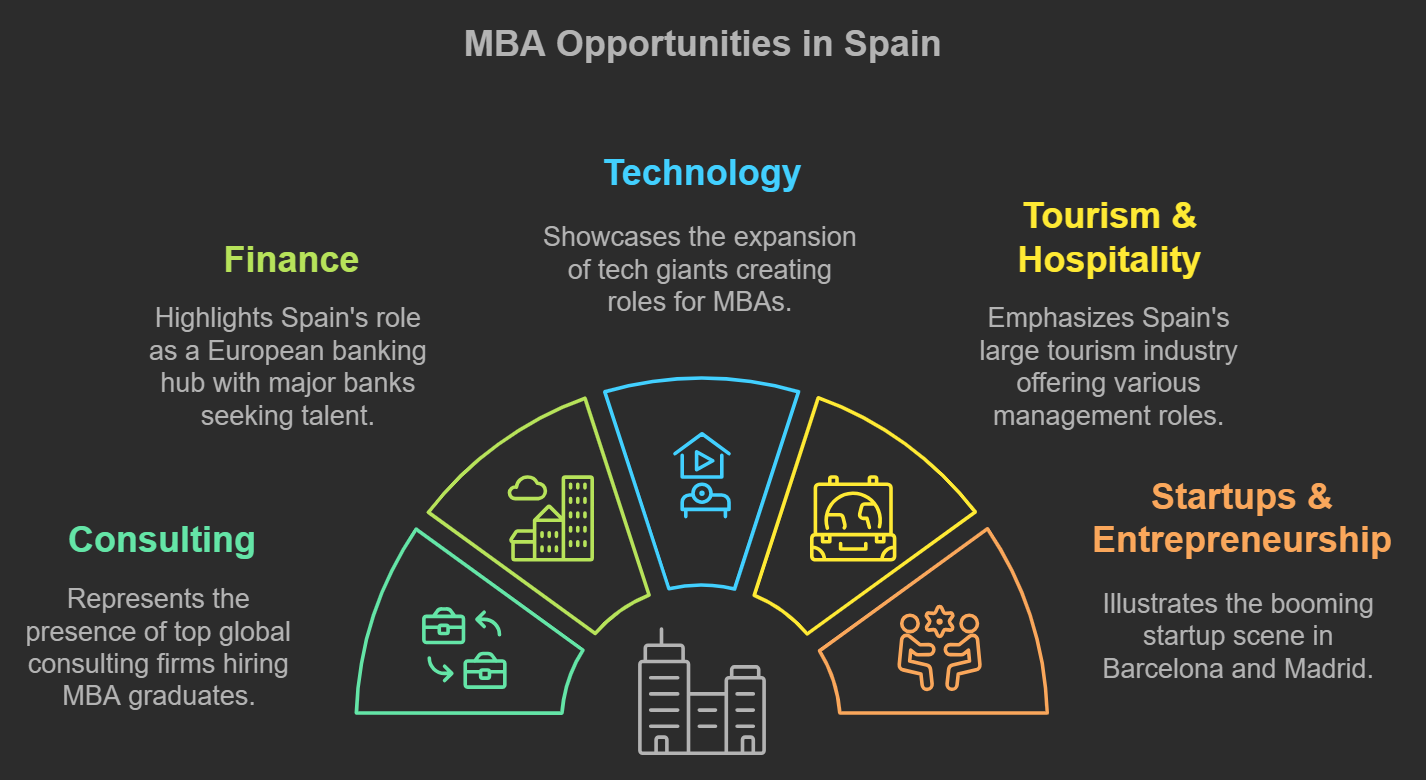
Deferred MBA Programs
Deferred MBA: Everything You Need to KnowDeferred MBA programs are becoming increasingly p…
Table of Contents

Thinking about doing an MBA? If you're considering your options for 2024, Spain should be on your radar. It’s home to some of the best business schools, has a vibrant culture, and offers great career opportunities. In this guide, we’ll walk you through why Spain is a hot spot for MBA students, what programs stand out, and how to choose between a 1-year and 2-year course. Ready to dive in?
So, why is Spain such a magnet for MBA students? Well, for starters, the country has world-renowned business schools like IE, ESADE, and IESE. But it’s not just about the academics—Spain offers a unique mix of great weather, affordable living, and a strategic location right in the heart of Europe. Here are a few reasons why Spain is so popular:
Let’s talk about what makes MBA programs in Spain stand out. Beyond the obvious academic reputation, these programs are designed to give you hands-on, real-world experience. Here’s what you can expect:
Spain is becoming a popular choice for Indian students, and it's no surprise why. With affordable tuition, scholarships, and a growing Indian community, Spain ticks a lot of boxes. Here’s why more Indian students are packing their bags for Spain:
One of the big decisions you’ll need to make is whether to go for a 1-year or 2-year MBA. Not sure which one’s right for you? Here’s a quick breakdown:

Let’s recap some of the key perks of doing your MBA in Spain:
Spain is home to some seriously impressive business schools. Here’s a quick overview of the top schools:
Business School | Location | Global Ranking | Specializations |
| IE Business School | Madrid | Top 10 globally | Digital Business, Entrepreneurship |
| ESADE Business School | Barcelona | Top 25 globally | Global Management, Innovation |
| IESE Business School | Barcelona | Top 15 globally | Leadership, General Management |
| EADA Business School | Barcelona | Top 100 globally | International MBA, Marketing |
| ESCP Europe (Madrid Campus) | Madrid | Top 100 globally | Business & Digital Strategy |
| EU Business School | Barcelona | Top 150 globally | International Management, Finance |
| ESIC Business & Marketing School | Madrid | Top 100 in Europe | Marketing, Digital Business |
So, what do you need to get into an MBA program in Spain? The good news is that most of the top business schools have pretty standard requirements, but let’s break them down so you know exactly what to expect.
First things first, you’ll need a bachelor’s degree. It doesn’t necessarily have to be in business—students from all academic backgrounds are welcome to apply. Whether you studied engineering, the arts, or science, as long as you have a solid academic record, you’re good to go.
Here’s where things vary a bit. Many Spanish MBA programs prefer candidates with 2-5 years of work experience. It’s not just about having a job—it’s about demonstrating leadership potential, problem-solving skills, and a track record of success.
Since many MBA programs in Spain are taught in English, non-native speakers will need to prove their English proficiency. You’ll usually need to take either the IELTS or TOEFL exam.
If English is your first language or you’ve studied your bachelor’s degree in English, you may not need to take these tests—check with the school to be sure!
Most top business schools in Spain require you to submit either GMAT or GRE scores. But don’t worry if standardized tests aren’t your strong suit—some schools are flexible about this.
A GMAT score of 600+ or a GRE equivalent will strengthen your application, especially if you’re aiming for schools like IE or IESE.
This is where you get to shine! Your Statement of Purpose (SOP) is your chance to explain why you want to do an MBA in Spain, what your career goals are, and why you’re the perfect fit for the program. Be clear, be honest, and most importantly, let your passion show.
You’ll also need 2-3 Letters of Recommendation (LORs).
After you’ve submitted all your documents, some schools will invite you for an interview. Don’t sweat it—this is your chance to talk more about your experience and show them why you’re a great fit.

Let’s talk numbers. One of the biggest factors when choosing an MBA is figuring out the costs. The good news? Spain is known for offering top-quality education at a more affordable price compared to other MBA destinations like the US or UK. And don’t worry, there are plenty of scholarships and financial aid options to help you along the way.
While tuition fees can vary based on the school and program, here’s a general idea of what you’ll be looking at:
Business School | Location | Tuition Fees (EUR) | Tuition Fees (USD) |
| IE Business School | Madrid | €70,000 | ~$75,000 |
| ESADE Business School | Barcelona | €62,000 | ~$66,000 |
| IESE Business School | Barcelona | €89,000 | ~$95,000 |
| EADA Business School | Barcelona | €37,000 | ~$40,000 |
| ESIC Business School | Madrid | €29,600 | ~$32,000 |
You’ll notice that tuition fees at some of the top schools in Spain, like IE and ESADE, are generally lower than what you’d find at leading schools in the US, where the cost can exceed $100,000.
Living in Spain is generally more affordable than in cities like London or New York, but it can still vary depending on where you study. Here’s a rough estimate of what you can expect to spend per month on living expenses in Spain’s major cities:
City | Monthly Living Expenses (EUR) | Monthly Living Expenses (USD) |
| Madrid | €1,200 – €1,600 | ~$1,300 – $1,750 |
| Barcelona | €1,100 – €1,500 | ~$1,200 – $1,650 |
| Valencia | €900 – €1,200 | ~$970 – $1,300 |
Your living expenses include rent, food, transportation, and personal expenses. Of course, this can vary depending on your lifestyle. For example, renting an apartment in the city center will be more expensive than in the suburbs.
Let’s face it, financing an MBA can be a challenge, but there’s good news: plenty of scholarships are available, especially for international students. Whether you’re looking for merit-based scholarships, need-based financial aid, or scholarships for students from specific regions (like India), you’ve got options.
Here are some of the most popular scholarships available for MBA students in Spain:
Scholarship Name | Eligible For | Details |
| Erasmus+ Scholarship | International students | Covers part of tuition and living expenses |
| Fundación Carolina Scholarship | Indian students and other developing countries | Financial support for tuition and living costs |
| IE Business School Scholarships | International students | Merit-based, covering up to 50% of tuition |
| ESADE Scholarships | Merit-based and diversity scholarships | Available for international students |
Many universities, like IE Business School and ESADE, also offer their own scholarships that can cover up to 50% of the tuition fees. It’s always a good idea to check directly with the school to see what scholarships you may qualify for.
Indian students have additional options, as Spain is actively working to attract more talent from India. Some scholarships to keep in mind:
Beyond university scholarships, there are also Spanish government scholarships and private sector funding options available for international students. Look into programs like the ICEX Scholarships for international business students or the Santander Scholarships for more financial aid options.
So, what happens after you finish your MBA in Spain? The job market in Spain—and across Europe—is promising for MBA graduates, with opportunities in a range of industries. Here’s a quick breakdown of what you can expect in terms of job prospects and salaries.
Spain is home to many leading industries, and these are the sectors currently in high demand for MBA graduates:

Salaries after completing an MBA in Spain vary by industry and job role. Here’s an idea of what you can expect:
Industry | Average Salary (EUR) | Average Salary (USD) |
| Consulting | €70,000 – €100,000 | ~$75,000 – $110,000 |
| Finance | €60,000 – €90,000 | ~$65,000 – $100,000 |
| Technology | €65,000 – €90,000 | ~$70,000 – $100,000 |
| Marketing | €55,000 – €75,000 | ~$60,000 – $85,000 |
| Tourism & Hospitality | €45,000 – €65,000 | ~$50,000 – $70,000 |
Spain is home to many international and local companies actively hiring MBA graduates. Some of the top names include:
One of the advantages of doing an MBA in Spain is the strong placement support offered by schools. Business schools like IE, ESADE, and IESE have dedicated career services that connect students with top companies, host career fairs, and offer workshops on job hunting and interview skills.
For Indian students, networking is key. Tap into alumni networks, attend career fairs, and make use of your school's connections with Spanish and European employers. Learning some basic Spanish can also give you an edge in the job market, even if you're applying to international companies.

Spain makes it easy for MBA graduates to stay and work after completing their degree with several visa options.
After your MBA, you can apply for the Permiso de Residencia por Estudios, allowing you to stay in Spain for up to 1 year to find a job or start a business.
When you secure a job, you can apply for a work visa. Your employer sponsors it, and the visa is valid for the length of your contract.
To get Permanent Residency (PR) in Spain:
The EU Blue Card is another option for skilled professionals. It allows you to live and work in Spain and across the EU. Requirements include:

Good news: if you’re not keen on taking the GMAT, there are several top business schools in Spain that either offer GMAT waivers or don’t require it at all. While many MBA programs still prefer or require GMAT scores, some are more flexible, especially if you have a strong academic background or significant work experience.
Several Spanish business schools understand that not everyone shines through standardized tests like the GMAT, and they’re willing to look at other factors when reviewing applications. Here’s a look at some of the schools where GMAT waivers are possible:
Business School | GMAT Waiver Policy |
| IE Business School | Waivers considered for candidates with strong academic or professional achievements. |
| ESADE Business School | May waive GMAT for applicants with extensive work experience or outstanding academic performance. |
| EADA Business School | Flexible GMAT policy—strong work experience or an excellent undergrad GPA can make up for no GMAT. |
| ESIC Business School | No GMAT required—focuses on professional experience and leadership potential. |
If you don’t want to submit a GMAT score, focus on strengthening other parts of your application. Schools are increasingly considering work experience, leadership roles, and academic performance as solid alternatives to the GMAT.
Pros:
Cons:

Spain is an excellent choice for your MBA, offering prestigious business schools, affordable tuition, and access to the European job market. With a vibrant culture, English-taught programs, and post-study work visas, Spain provides a perfect blend of education and lifestyle for international students. Whether you want a 1-year or 2-year program, Spain gives you the flexibility to choose what fits your career goals.
Ready to pursue your MBA in Spain? MastersBuddy is here to guide you! From program selection to visas and scholarships, we’ve got you covered. Contact us for expert advice on starting your MBA journey today.

